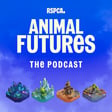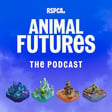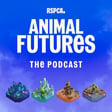
Is lab-grown meat a game-changer for animals and would you try it?
With the world's population growing, and so many farm animals needed to keep everyone fed, is our food system sustainable? And what are the consequences for animal welfare? Broadcaster and journalist Kate Quilton chats to Riley Jackson, Head of Partnerships and Marketing at Ivy Farm Technologies, about one possible alternative - lab-grown, cultivated meat; and whether it could revolutionise where our food comes from, and society's reliance on animals. Kate also chats to Professor David Halpern CBE, President Emeritus at the Behavioural Insights Team, or the 'Nudge Unit'. He talks about the role governments have played in 'nudging' us to think differently about food - including making the humble potato a Royal delicacy! David discusses the role such strategies could play in encouraging the public to consider a future where lab-grown meat and alternative proteins regularly feature on our supermarket trolleys.
The Animal Futures podcast is part of the RSPCA Animal Futures Project, which explores five possible scenarios of what the world could be like for animals in 2050. People listening between 5 and 28 February or 17 March to 6 April 2025 can join The Big Conversation. After that, you can find out more by playing the interactive Animal Futures game.
Host: Kate Quilton
Guests: Riley Jackson and Professor David Halpern CBE
Produced by: Mark Adams, Chris O'Brien, Emily Prideaux and Jo Toscano.
Animal Futures Project: https://www.rspca.org.uk/whatwedo/latest/animalfutures
Animal Futures Game: https://www.rspca.org.uk/webContent/animalfutures/
Animal Futures: The Big Conversation: http://rspca.org.uk/bigconversation



